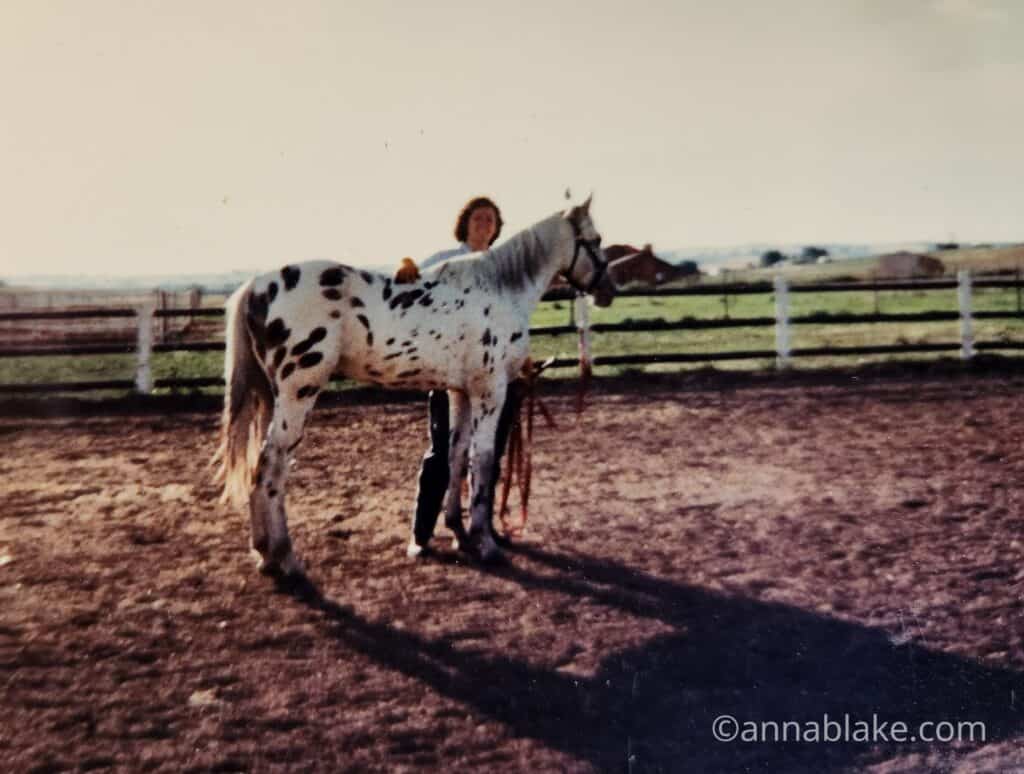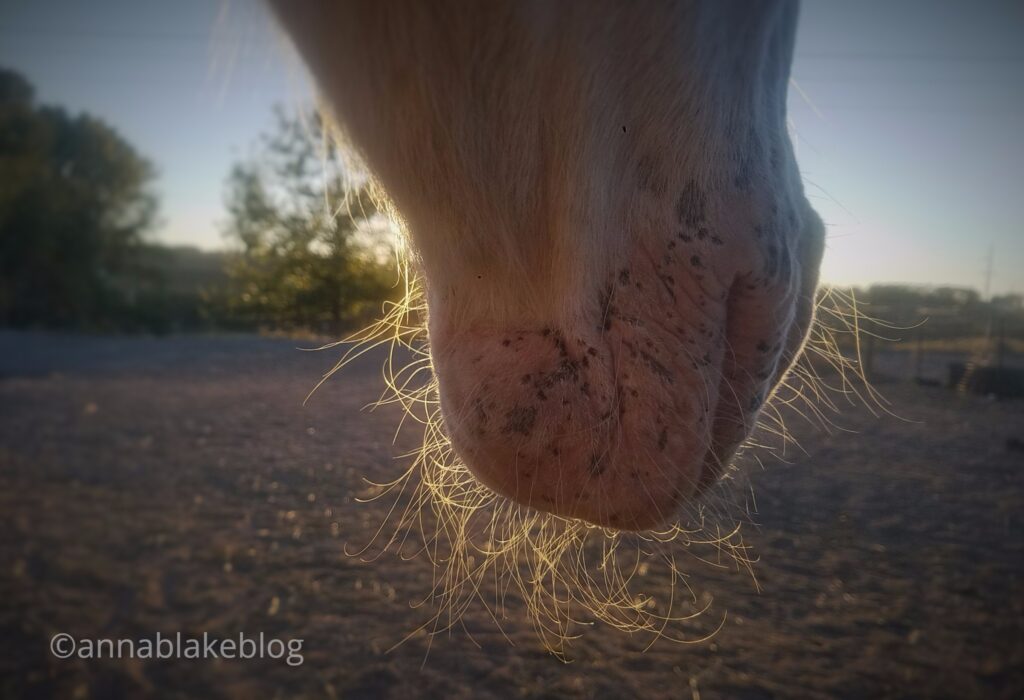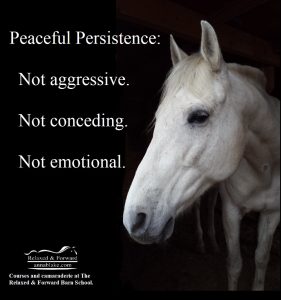
Driving home through northern Colorado yesterday, I passed the Berthoud off-ramp. Otherwise known as the Grandfather Horse off-ramp. I’ve only taken it twice; once when I went to look and once when I went to buy. I think there should be a birthplace monument there, one that would dwarf the Statue of Liberty. Beware. An off-ramp might be an on-ramp. Back when we met, he was just a skinny yearling stud colt. And I’d been saving up for a trip to Belize.
People say they wish they’d known me forty years ago. A certain colt would be the first to say, I was no prize back then. This is photographic proof. In hindsight, I was damaging his confidence and his balance because I thought I knew how he should walk. I did plenty wrong, and that was what doing my best looked like.
Most of us are so busy training our horses that we don’t think much about how humans learn. We all feel we have frustrated, confused, and failed our horses at one time or another. We dutifully recite the “know better, do better” quotes but get little satisfaction. We tell the same stories about horses from our past. Once we stop fighting them, we are happy to call them our teachers, but it always comes with a bittersweet sadness. We didn’t know then what we know now.
Well, of course, not. Learning isn’t a straight, clean line. It isn’t a precise answer like you get in a math class. It is always as nebulous as an art class. If you haven’t had one, here’s the problem with art classes. If they say you’re good, it doesn’t mean you are and if they say you’re bad, it doesn’t mean you fail at art. The best thing you learn in art class is that the art world is nebulous and fickle. It’s perfect training for the horse world where we never start in kindergarten and wind up with a master’s degree by putting one foot in front of the other. Horses are nebulous and fickle.
The challenge in learning about horses is not just that it’s endless, but it’s also easy to get lost because the learning goes off in all directions at once. It’s a spherical experience. Learning involves each of your senses, just as important as your brain. Read everything from memoirs to research papers. Keep an open mind and keep reading. Watch others. It isn’t enough to see the idea. You want to see it done well and done badly and see it done with different horses. Video yourself and watch others. Teach yourself to focus. Then talk about it and listen to trainers and friends talk about it. Write it out in a journal because it is another way to learn. Collect data and compare it. Go hear another person teach it, not that you don’t know the idea, but because they might use different words that would deepen your knowledge. Listen, digest, ask, digest, repeat.
Keep understanding as your top priority. Believe your horse because they are intelligent. But what they say might not make sense, so learn their calming signals. Ask again. Then listen better and dive deeper. Don’t let tradition hold you back because science is our friend. Learn until you can’t fit another thing in your brain, and then trust your intuition. But keep reading.
Get comfortable knowing you don’t have a finish line. It isn’t a race. Let go of right or wrong, and instead notice more. Gain perception. No two horses learn alike, and no two people do either. We can’t measure ourselves because we are unique. Let that sink in. It’s fantastic news. Then feel your body change. Understanding is more important than knowledge, but that wisdom takes longer to collect. Now stop worrying about your age. Slow down, your horse needs time to process. And surprise, so do you. Relish the time spent communicating because that is the magic part. It’s the part we never want to be over.
Eventually, we figure out it was not about finding the right method, and as much as horses might be our passion, not one bit of it was ever personal. It was always about the horse. We do not direct the movie of that horse’s life. We only play a supporting role but playing that part well will make all the difference.
Of course, that good horse dies because they all do. The next horse is different. It feels like nothing you know works. You might even blame the new horse for being alive. Things come apart for a while, and we can’t tell if it’s them spooking or if it’s us. We collapse in doubt, thinking we don’t know enough. Maybe we must hit bottom to be reminded the foundation of a horse is always where we start. Never where we left off with the last horse. We learn to depend on the fundamentals and we’re lucky to have so much experience there. Then you remember it isn’t a road or even an overgrown path. It’s still a nebulous sphere of understanding. Even better than that, everything in that sphere is working for you, not against you. You notice you are breathing again. Breathing is the price of admission to all things horse.
 We act like horses do math, counting our mistakes. Like horses blame us for what we don’t know. See it from their side. When we feel bad, we stand around like coyotes. But not normal ones; we’re coyotes barfing up rodents and apologizing to their little corpses. Get over it. It’s the circle of life. If we are breathing, we are learning. Our regret or guilt is a waste of time, but more importantly, it makes horses nervous. Why bring it up? Do we make children apologize for being childish?
We act like horses do math, counting our mistakes. Like horses blame us for what we don’t know. See it from their side. When we feel bad, we stand around like coyotes. But not normal ones; we’re coyotes barfing up rodents and apologizing to their little corpses. Get over it. It’s the circle of life. If we are breathing, we are learning. Our regret or guilt is a waste of time, but more importantly, it makes horses nervous. Why bring it up? Do we make children apologize for being childish?
In every moment, when we’re learning for the horse we are with, we’re also learning for the next horse. It’s how we thank them. We are their legacy. They bequeath us to others and we become the legacy of those horses, too. How else can it make sense? We must learn well and trust our best will always be good enough for them. Then we kindly let it be good enough for us, too. We have nothing to apologize for.
Forgive yourself, so your horse can be free of your past.
As for that skinny colt, he got old and died, of course. And he is alive in every word I write and every lesson I teach. He and I explored the infinite mind together. Who needs Belize?
…
If you appreciate what I do, please Subscribe to this blog or join us at The Barn School.

Anna Blake, Relaxed & Forward
Want more? Become a “Barnie.” Subscribe to our online training group with affirmative demonstration videos, audio blogs, daily quotes, free participation in “group lessons”, and live chats with Anna. Become part of the most supportive group of like-minded horsepeople anywhere.
Anna teaches ongoing courses like Calming Signals and Affirmative Training at The Barn School, along with virtual clinics and our infamous Happy Hour. Everyone’s welcome.
Visit annablake.com to find archived blogs, purchase signed books, schedule a live consultation, subscribe for email delivery of this blog, or ask a question about the art and science of working with horses.
“We’re coyotes, barfing up rodents and apologizing to their little corpses.”
Possibly the best description ever of the complexities of human nature.
that stood out to me too, Susan!
Thanks, Susan. I was a bit proud of that.
Good one!
So much wisdom here! A sphere description is perfect. Hard to be in a sphere when my brain is linear😊.
Is your brain linear? Lots of us are spherical thinkers. But I agree. Learning a nebulous thing is, well, nebulous. Thanks, Karen.
Trying to write a comment, but for some reason all the letters have become blurry…
I have no doubt that skinny colt loved every moment he spent with you.
We are all the future for horses. Thanks Cathy.
Those were wonderful words, we all need to keep learning. I have been reading a lot of my books over again so that I might gain more knowledge and in site to my horses world and brain. The biggest thing I have to remember is that he/she is a horse and doesn’t think like we do. They don’t have that big frontal cortex like we do . Their nature is to flee for self preservation. We as a human are there to help and support them when their alarm bells go off. We need to build their trust in us so that they will seek our help when this happens. It is worth it.
Thanks, Virginia. Re-reading is good, too. And it is so we can help them.
Thank you, Ginny.
Visceral. “If we’re breathing we’re learning”.
Mic drop. Thanks, June.
yes!
Spherical is a good way to describe the journey with horses. The journey leads us to learn more circle back and make the next circle rounder, more defined, and on and on. It reminds me of the elusive perfect 20-meter circle on a Dressage test. No use lamenting that that last circle was a bit egg-shaped, just do better on this one. Thank you for being one of the most persistent voices on my shoulder reminding me to do better and lighten up.
I think the universe exists in a twenty meter circle. Not that I care. Thank you my friend.
you nailed it again Anna in a spirally, spherical way of course. Thank you and thanks to all who comment.
Thanks, Kate.
Forgive yourself; forgive yourself- yes that’s definitely needed. This last weekend at a cow working clinic, my horse, who loves working cows, started throwing his head wildly and jumping around going after a steer. After a comment from my teacher about us both being too excited, I realized I caused the problem. I was starting to feel bad about my riding, but realized that we could do better from then on. We calmly did our next run, and he did his job in the best way possible. I need to keep reminding myself to forgive my mistakes and that I will keep trying my best for my horse.
As this is confession blog, my trainer always told me I had too much blood in my eye. Not a compliment. Thanks, Maureen. She would warn you to not get between a cow and a horse. Smile, she has been gone longer than that horse, but I hear her everyday, too.
Everything you write is spot on.
Halfway through your Going Steady, same way with it!
Thank you! Thanks for giving the book a shot.
I certainly don’t need Belize (much to my husband’s frustration, but hey, he knew he was marrying a horse-crazy girl!).
Well, I don’t quite feel sorry for him. But I do like him. Thanks Michelle.
Anna, how strange! I just submitted a comment and a message came up that said something like, it was checking if I was human and then my comment disappeared. The technological world is puzzling sometimes.
Anyway, I just wanted to say that I’m so glad that you are here for us and clearly so are our horses. I’m using thoughts of all the new skills I’ve acquired because of you to help tamp down that annoying guilt and regret. Thank you!
I hope this comment gets to you.
You are here, and I never know what happens on the back side of things on this website, I can’t see any of it. Glad to know you are on the positive side of things with your herd, because your herd really is kind of an exception (one or two of them) to the rules. Thanks Laurie
Yum..Thanks for the tasty thoughts, Anna!
You’re welcome, thanks Lynell
You don’t know me and we live continents apart, but I would just like you to know this. When I sit quietly in my pajamas, reading this with my morning coffee, and my eyes blur up over the knot in my throat, it is because you just slammed a hammer into all my “doing it wrong, doing too much, doing too little” guilttrip laden messy horsemanship. And I’m eternally grateful for teachers like you in my, and my horses’ lives. Your legacy, and that of the horses that taught you, is reaching far wider than you think. Thank you
Thank you, Daleen. I’m sitting here in my pajamas with my morning coffee, no kidding, and so grateful. The world is a small place, a skinny colt made a difference. Your note means so much to me, thank you.
This is an excellent essay, as always. But maybe even MORE excellent than usual. Thank you for keeping us on our toes about forgiving ourselves and moving on. As Susan commented in the group yesterday, the sentence about being coyotes, barfing up rodents & apologizing is truly inspired. I think I have already made maybe a million mistakes with Tango, but he seems very forgiving. I do the same, most of the time.
I know you said photo was an example of your being a bad trainer at that time, but I dearly loved seeing him as a youngster with you beside him. His legacy and legend live on.
I am his legacy, very big hooves to fill. Thanks, Sarah. But don’t we all have horses we hold in that place?
Wow! That was absolutely beautiful. And so meaningful. Thank you Anna!
Thanks, Sueann.